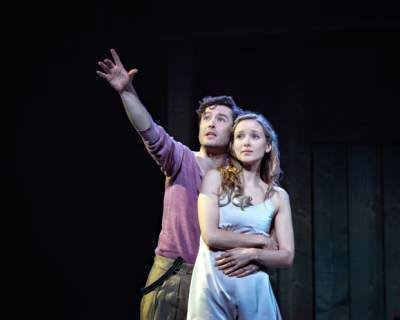One of Shakespeare’s most beloved plays, Romeo and Juliet has been a near-constant presence on stage since 1595. For many people of my generation, Baz Luhrmann’s cinematic take on the play—in which Leonardo DiCaprio and Claire Danes deliver top-notch angst against the sun-drenched backdrop of Verona Beach—looms large in the imagination.
Lindsay Posner’s production may not be quite as contemporary as Luhrmann’s—alas “Love Fool” by The Cardigans doesn’t feature at any point—but he does update the action from the sixteenth century to 1930s Italy. In the programme notes, Posner explains that Romeo and Juliet suits this particular historical period because the violent rivalry between the Montagues and the Capulets makes sense within the context of Mussolini’s dictatorship. This may be true, but the production’s twentieth-century setting is only really apparent in Sue Willmington’s attractive costumes, particularly Tybalt’s (Edward Sayers) change into Fascist attire.
This is not a serious issue, however, as Romeo and Juliet is primarily about a combustible love affair between two ill-fated teenagers. Unlike Damian Cruden’s production of Macbeth, Lindsay Posner manages to get at the heart of Romeo and Juliet by capturing the devastating passion that suddenly overtakes its title characters.
Posner is helped in this regard by two strong central performances. As Romeo, Alexander Vlahos blends love-struck awkwardness (Romeo is a bit of a nerd, after all) with irrepressible energy and charm. Alexandra Dowling impresses as Juliet, particularly during the first half where Juliet realises her longing for Romeo. Both actors speak Shakespeare’s verse with great feeling, and watching the two characters fall in love is a deeply moving experience.
The rest of the ensemble do a fine job in their various roles. David Fleeshman imbues Friar Laurence with the right amount of paternal warmth and Julie Legrand excels as Juliet’s doting but scatter-brained nurse. Robert Gwilym’s Cockney-accented Capulet is genuinely intimidating during his confrontation with Juliet, although his extreme level of anger becomes rather samey after a while. Shanaya Rafaat is likely to ruffle the most feathers with her bold take on Mercutio, the play’s most beloved character. Everyone knows that Mercutio is a born show-off, but Rafaat’s performance is extravagantly over-dramatic at times.
Romeo and Juliet is very much a play of two halves, and I would argue that the second part of this production lacks the energy and verve of the first. Once Romeo murders Tybalt in retribution for Mercutio’s death, the production loses some of its momentum and I found myself willing the climactic suicide scene to take place as soon as possible. However, with nearly two months left to go, it’s possible that the production will become tighter in the second half.
Despite some misgivings, I still thought this was a strong and fresh production of a play that can seem overfamiliar at times. It may not be perfect, but all the essential elements are there, and I would recommend it to anyone looking for an opportunity to sample Shakespeare’s Rose Theatre before it vanishes in September.


